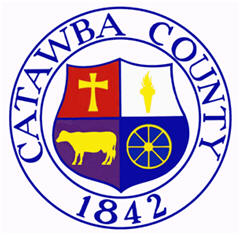
Two Catawba County programs have been recognized with Local Government Federal Credit Union (LGFCU) Excellence in Innovation Awards for 2013 The awards competition is conducted by the North Carolina Association of County Commissioners and sponsored by the LGFCU.
One of two winners in the Human Services category, Catawba County Social Services was honored for its Educational Advocate program, which provides special assistance to children who are moving into foster care.
Transitioning into foster care is not easy for a child. To try to make this transition as easy as possible and to minimize the number of school moves, Catawba County DSS started an Educational Advocate Service with the goal of improving educational continuity and stability for children in foster care.
The Educational Advocate is a full-time social worker who serves as a liaison with the county’s three public school systems and focuses on the educational achievement, stability and continuity of children from their entry into foster care through post-care. The Educational Advocate is part of the Child Wellbeing Project, a research partnership with The Duke Endowment, which provides an array of supportive services to improve the well-being of children who have been in the custody of Catawba County DSS.
As part of the initiative, Catawba County DSS established relationships with the three school systems in the county; reworked the foster care database to identify school-aged children in foster care, their grade levels and school placements; and identified school designees at each school. After memoranda of understanding were finalized between the three public school systems and Catawba County DSS, protocols were implemented around: (1) identification of children; (2) sharing of report cards; (3) reducing the number of school moves; and (4) enrolling children who moved schools due to foster care placement.
The goal of the service is to keep children in their school of origin, if possible, as they enter/exit foster care, to facilitate timely recorded exchange and sharing of information across systems, and work to keep children on grade level academically and address their educational challenges.
Catawba County’s EcoComplex has also been recognized with a Local Government Federal Credit Union (LGFCU) Excellence in Innovation Award for 2013. One of two winners in the General Government category, Catawba County was recognized for its Thermal Energy Exchange, Capture and Utilization Project (TEECUP).
In 1999, Catawba County became the first landfill owner/operator in North Carolina to use landfill gas to generate electricity. The engines used to generate electricity produced a substantial amount of thermal energy or heat as a byproduct. Recognizing the potential of this thermal energy byproduct, county staff began to develop the concept for today’s Regional EcoComplex and Resource Recovery Facility (EcoComplex). The basic principle of the EcoComplex is that each component’s byproducts must be used as a fuel source, energy source or some other through-put for another EcoComplex entity. These synergetic Eco Complex relationships are a system of applied industrial ecology to waste management.
Located adjacent to the Biodiesel Facility are three one-megawatt landfill gas-to-energy generator sets. Each generator contains a cooling system, not unlike the cooling system found in a car or truck, designed to keep the engines from overheating. As the coolant circulates through the engine, it transfers heat from the engines, thereby keeping them from overheating. The heat being carried away is a thermal energy source.
This energy source is now producing low-cost heat to warm the building and to heat water for use in the biodiesel production process. The TEECUP project has helped reduce biodiesel operational costs by eliminating the need for electric heat for the building and for part of the production process.
The Excellence in Innovation Awards provides a total of $8,000 in rewards to county employees who develop successful programs that help counties improve services to citizens. Cash awards of $1,000 each are given to two programs in each of four categories - general government, health and human services, public information/participation and intergovernmental collaboration.
For more information please contact Todd McGee at todd.mcgee@ncacc.org.
New, Reduced Membership Dues
A new, reduced dues rate is available for CAOs/ACAOs, along with additional discounts for those in smaller communities, has been implemented. Learn more and be sure to join or renew today!
